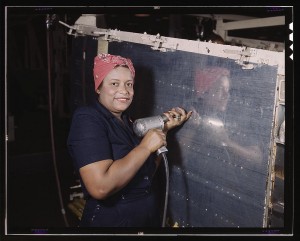
In Vultee-Nashville, Tennessee, a women works on a “Vengeance” dive bomber. Credit: Library of Congress.
Women, Religion and the Workplace Experience
Recently in the United States, some have asserted that the increasing complexity of women’s lives has contributed to a movement away from religion altogether. In a recent Huffington Post article, Phyllis Tickle, a Protestant Scholar and Atheist, called it “religiously imposed schizophrenia,” claiming that added workplace pressures simply don’t leave time or headspace for spirituality.
Women in the workplace already have the experience of being expected to be all things at once: ambitious yet unthreatening; aggressive yet feminine. During Women’s History Month many employers take the time to acknowledge and support women at work, and address the unique challenges and opportunities that they face. But how does religion fit into this picture? In our work, it has become clear that religion adds a layer of complexity to an identity that’s frequently left unaddressed in workplace conversations about gender.
There are countless ways that women’s religiosity can intersect with their work lives. In some religious households, holidays, religious observations and taking care of the family primarily fall to the female head of the household, making it more difficult for women to find work-life balance. In this context, one woman may feel wholly supported by flexibility options, while others might feel that schedule changes bring unwanted attention to their religious practices. Such unwanted attention can limit opportunities for advancement—a limitation that does not fall to men in her religious tradition in the same ways.
From Christianity to Islam to Sikhism to Wicca, many women find strength, power and motivation in their faith. But when a woman walks into a meeting with a head covering, how is she perceived by others? Our preconceptions and biases may cause us to interpret this woman’s religious strength as religious oppression.
Many women are unaffiliated with a specific tradition, but identify as deeply spiritual. Others may belong to new religious movements (NRMs), or have a deep appreciation for women and their connection to nature. But will her “atypical” or “untraditional” beliefs be treated differently than those who affiliate with a formal tradition when requesting time off to observe the solstice or the anniversary of her mother’s death?
However, many surveys show that women in the United States lead more active lives of faith when compared to men. A recent survey found the same to be true in the UK, with far fewer women identifying as atheist and agnostic than men. Why are women generally more likely to identify as spiritual and how does that affect their work lives?
An opinion article by Deborah Orr in the Guardian states “I think religion is more appealing to women because, at a community level, it has more social benefit to women. I’ve known a lot of women from my mother’s and my grandmother’s generations who would have been lonely without a church to provide a focus and a purpose in their lives, to offer company and a place to go once the children had left home and their husbands had gone (as they so often do, since women live longer).”
But when addressing women’s experiences of religion at work, these larger trends should be taken with a grain of salt. From moment to moment, an identifier may affect a woman differently at work: one moment a woman may find empowerment and motivation in her practice, and the next find marginalization for her “atypical” beliefs. The important question to ask is how do workplace initiatives address her needs? How can our policies include her? And perhaps most importantly during Women’s History Month, are we truly allowing women to bring their “whole selves” to work if conversations of religion have been shelved?